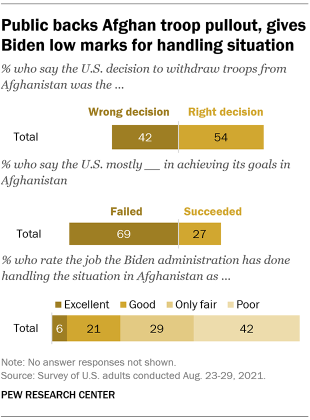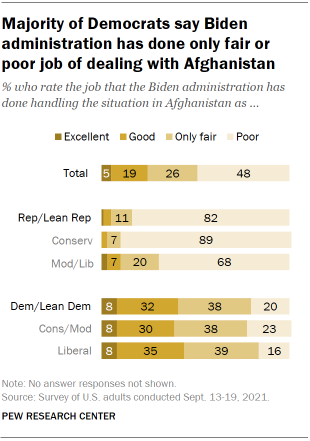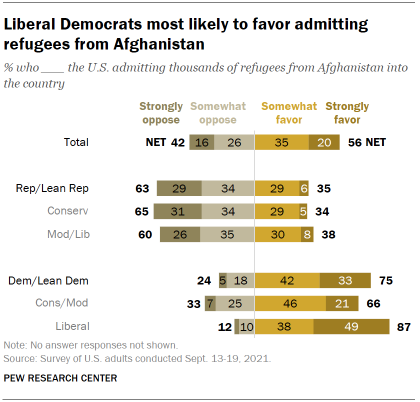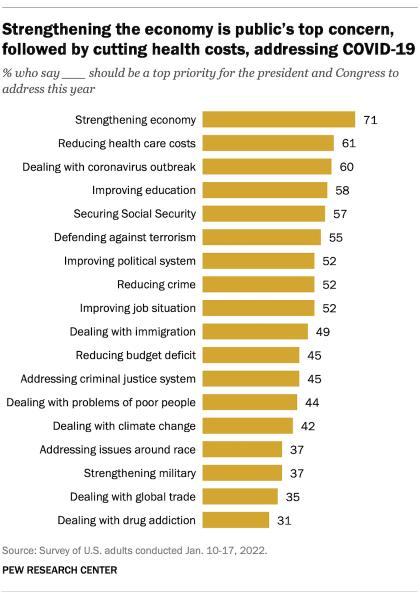
In August 2021, the United States withdrew the last of its troops from Afghanistan, ending its military presence there after nearly 20 years. The U.S. exit from Afghanistan resulted in the Taliban regaining control of the country and created a refugee crisis as many Afghans fled. It also raised fears that terrorists might use Afghanistan as a safe haven, as was the case with Ayman al-Zawahiri, the al-Qaida leader who was discovered in the nation’s capital, Kabul, and killed in a U.S. drone strike late last month.
A year after the U.S. military exit from Afghanistan, here’s a look back at how people in the United States and other countries have viewed the troop evacuation and its aftermath, as well as their broader attitudes about the war. All findings are based on previously published Pew Research Center surveys.
This Pew Research Center analysis examines Americans’ views of the troop withdrawal from Afghanistan and its aftermath. It is based on recent surveys conducted by the Center. Links to these surveys, including information about the field dates, sample sizes and other methodological details, are available in the text.
At the time of the military evacuation, 54% of Americans said the decision to withdraw U.S. troops from Afghanistan was the right one, according to a survey conducted in August 2021. Around four-in-ten Americans (42%) said the decision was the wrong one. There was a sharp partisan divide on this topic. While 70% of Democrats and Democratic-leaning independents said the decision to withdraw troops was the right decision, about half as many Republicans and GOP leaners (34%) shared this view. Most Republicans (64%) instead said the decision was wrong.

In the same survey, 69% of U.S. adults said the United States mostly failed in achieving its goals in Afghanistan. About a quarter (27%) said the U.S. succeeded. There was partisan agreement on this question: About seven-in-ten in both parties said the U.S. mostly failed to achieve its goals.
Americans harbored doubts about the war in Afghanistan even before the withdrawal of U.S. troops. In a spring 2019 survey, 59% of U.S. adults said that considering the costs versus the benefits to the United States, the war in Afghanistan was not worth fighting, while 36% said it was. The balance of opinion was about the same among U.S. military veterans.
Both during and after the troop withdrawal, large majorities of Americans expressed negative views of the Biden administration’s handling of the situation in Afghanistan. In both August and September 2021, about seven-in-ten or more said that the administration had done an only fair or poor job dealing with the situation there, with around four-in-ten or more saying it had done poorly. In both surveys, fewer Americans said the administration had done an excellent or good job. In the September survey, for instance, only 24% said this.

A large majority of Republicans (82%) said in September 2021 that the administration had done a poor job handling the situation in Afghanistan. Conservative Republicans were 21 percentage points more likely than moderate and liberal Republicans to say this (89% vs. 68%).
One-in-five Democrats also said the Biden administration had done a poor job dealing with the Afghanistan situation. About twice as many said the administration had done an only fair job (38%) or an excellent or good job (40%).
Veterans and non-veterans were also divided on this question. While similar shares of veterans (76%) and non-veterans (74%) said in September 2021 that the Biden administration had done an only fair or poor job dealing with the situation in Afghanistan, veterans were more likely than non-veterans to say the administration handled it poorly (60% vs. 47%). Only about a quarter or fewer in either group said the administration had done an excellent or good job, with very few giving it an excellent rating (4% of veterans and 5% of non-veterans). As is the case with the general public, veterans’ views on these issues are deeply divided along party lines.
Last September, a majority of Americans (56%) said they favored admitting thousands of Afghan refugees into the U.S., according to the same survey, which was conducted after the U.S. evacuated thousands of Afghans from the country. About four-in-ten (42%) opposed this move.

These views were deeply divided by partisanship. At the time, 63% of Republicans either strongly (29%) or somewhat (34%) opposed the U.S. admitting thousands of refugees from Afghanistan into the country. About a third (35%) said they favored admitting these refugees.
By contrast, three-quarters of Democrats were in favor of admitting refugees, including a third who strongly favored it. Liberal Democrats (87%) were more likely than conservative and moderate Democrats (66%) to support this. About half of liberal Democrats (49%) said they strongly favored admitting refugees from Afghanistan.
Despite majority support for admitting refugees, Americans were divided on whether the government was conducting adequate security screenings for those arriving in the U.S. from Afghanistan. About four-in-ten Americans (43%) said they were very or somewhat confident that the government was conducting adequate security screenings, while 55% were not too confident or not at all confident. Democrats were more likely than Republicans to express confidence in the government’s security screenings.
In a spring 2022 survey of 18 countries, people viewed the U.S. decision to withdraw all troops from Afghanistan as the right one, but many said the withdrawal itself was not handled well. A median of 52% across the surveyed countries said the troop pullout was the right choice, compared with a median of 39% who said it was the wrong choice.
Public opinion in these countries was more negative when it came to how the U.S. exit from Afghanistan was handled. A median of 56% said it was not handled well, while a median of 33% said it was. In only two surveyed countries, Poland and Malaysia, did half or more of adults approve of the way the situation in Afghanistan was handled.
Most Americans said in August 2021 that Taliban control of Afghanistan is a threat to the security of the United States. Nearly half (46%) said Taliban control represented a major threat to the U.S., and another 44% saw it as a minor threat. Republicans (61%) were far more likely than Democrats (33%) to view a Taliban-controlled Afghanistan as a major security threat.

In a January 2022 survey, 55% of Americans said that defending against terrorism should be a top priority for the president and Congress to address this year. Of the 18 issues asked about, defending against terrorism was among the top priorities identified. The survey preceded the U.S. military’s drone strike on al-Qaida leader Ayman al-Zawahiri in Kabul in July.
Americans tend to prioritize the terrorism issue differently based on factors including age and partisanship. About three-quarters of adults ages 65 and older (76%) said that defending against terrorism should be a top priority for the president and Congress, compared with 32% of those under 30. And roughly two-thirds of Republicans (65%) said it should be a top priority, compared with 48% of Democrats.
